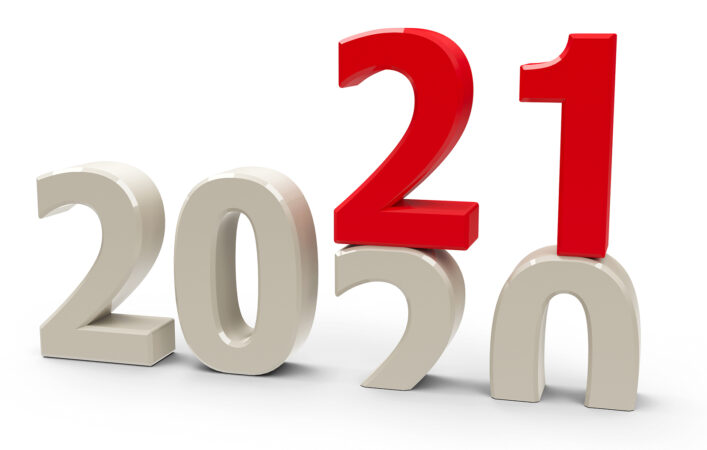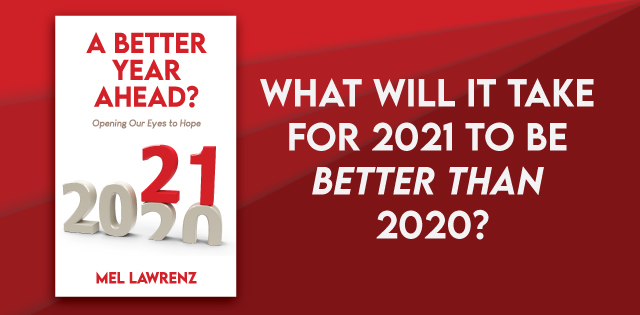[Chapter 1 of the new release A Better Year Ahead? Opening Our Eyes to Hope]
Everyone I know agrees with this simple sentiment: 2020 was a difficult year. A shockingly difficult year. An unprecedented difficult year. And they all wonder: Is there reason to hope that the new year might be better?
Of course, any of us may have that sentiment whenever we’ve had a difficult year. Loss of a job, a marriage that broke apart, an unwelcome medical diagnosis, a recession, an unexpected bereavement—there are so many ways any of us can have “a bad year.” Then we come to the end of December, cross into January, and wonder: Is it possible for next year to be better than the past one?
But 2020 was different. Once in a great while, there is a year that goes beyond the normal cycle of gains and losses we all go through. Only once in a very great while there is a year when one’s whole country, and (amazingly) the whole world, is shaken in such a way that our faith is tested, our love is strained, and our hope is stretched to its limits.
Of course, the pandemic of COVID-19 is the major precipitating event that made 2020 so difficult, but it was not the only crisis. No matter what you think about the realities of this virus and disease, there is no disputing this: the first pandemic of the 21st century has affected the whole world in one way or another. It has upended our lives, strained our relationships, reshaped our work patterns. This is not the first time the world has been disrupted and confused by a disease, and it will not be the last.
There were other troubles that hit massive numbers of people in 2020. Unprecedented numbers of workers lost their jobs. Racial tensions flared up, revealing the ongoing need for serious social reform. Pockets of radical groups clashed with each other in city streets. We witnessed both peaceful protests and flareups of rage and violence. Opportunists are never far away.
These are the events that dominate the headlines, but there are other powerful social fissures, not yet fully realized, that will challenge us for years to come. What will happen in families where staying at home has not been a blessing of familial togetherness, but an increase of tensions and even domestic violence? How will social distancing affect our relationships long-term? And what about widespread grief on the other side of loss? Most people have not even begun to grieve what they have lost in 2020. We are still in the middle of the losses. Dealing with it all, psychologically and spiritually, will require honesty and courage.
How will disconnectedness and isolation shape us? What will happen to people who lost their businesses? Will people come back to their churches, or will a significant percentage stay away?
And so, we may wonder: Is there a better year ahead? The only honest answer is that it depends. We will have to cope with stresses and losses that are beyond our control, but we can indeed have a better year if we make good and wise decisions with what we can control. Some of our losses in 2020 were imposed on us, and some, we brought on ourselves.
We can have hope, but not if hope is merely wishful thinking. Hope always leads to a call to action. It is not passive sentiment—it is a powerful engine propelling us toward better days, if we so choose.
Loss does not need to have the final word. On the other side of loss is the possibility of gain. The pandemic of 2020 and beyond has forced companies to redefine productivity. It has forced churches to see themselves as something much more than a series of gatherings. Families have invented new ways to hold together.
Seeing the positive is not to live in denial and put a happy face on loss. That never works, and may set us up for a bigger downfall later. This is a time for us to be ruthlessly honest about the losses we have experienced, at the same time that we hold the door open for better days ahead. If 2020 was horrible for you, admit it. Don’t underplay it and don’t exaggerate it. If 2020 was not difficult for you, admit that. Lots of people were not negatively affected in 2020. Working from home was just fine. They did not get sick. They held onto their jobs, and their investment accounts may have seen handsome growth.
Self-awareness and other-awareness have never been more important. Some people need to grieve their losses, and others (who have not lost much) need to have more empathy than ever for their neighbors who are bleeding. We need fine-tuned sensibilities now, not simplistic social dogmas. We need to look deeply into the social, spiritual, and psychological undercurrents this past tumultuous year has produced. We need to share in the sufferings of others, and then look for healing. And we need truth.
Is it possible that there is a better year ahead?
Yes, of course. Despite the fact that the Coronavirus will continue to spread for some time to come and our lifestyles will be different from what we were used to, it is always possible for the days ahead to be better. Hope is not the belief that all our problems will go away, but that we will be able to survive and build new strength if our minds perceive reality and our hearts demand what is good.
[Chapter 1 of the new release A Better Year Ahead? Opening Our Eyes to Hope]



